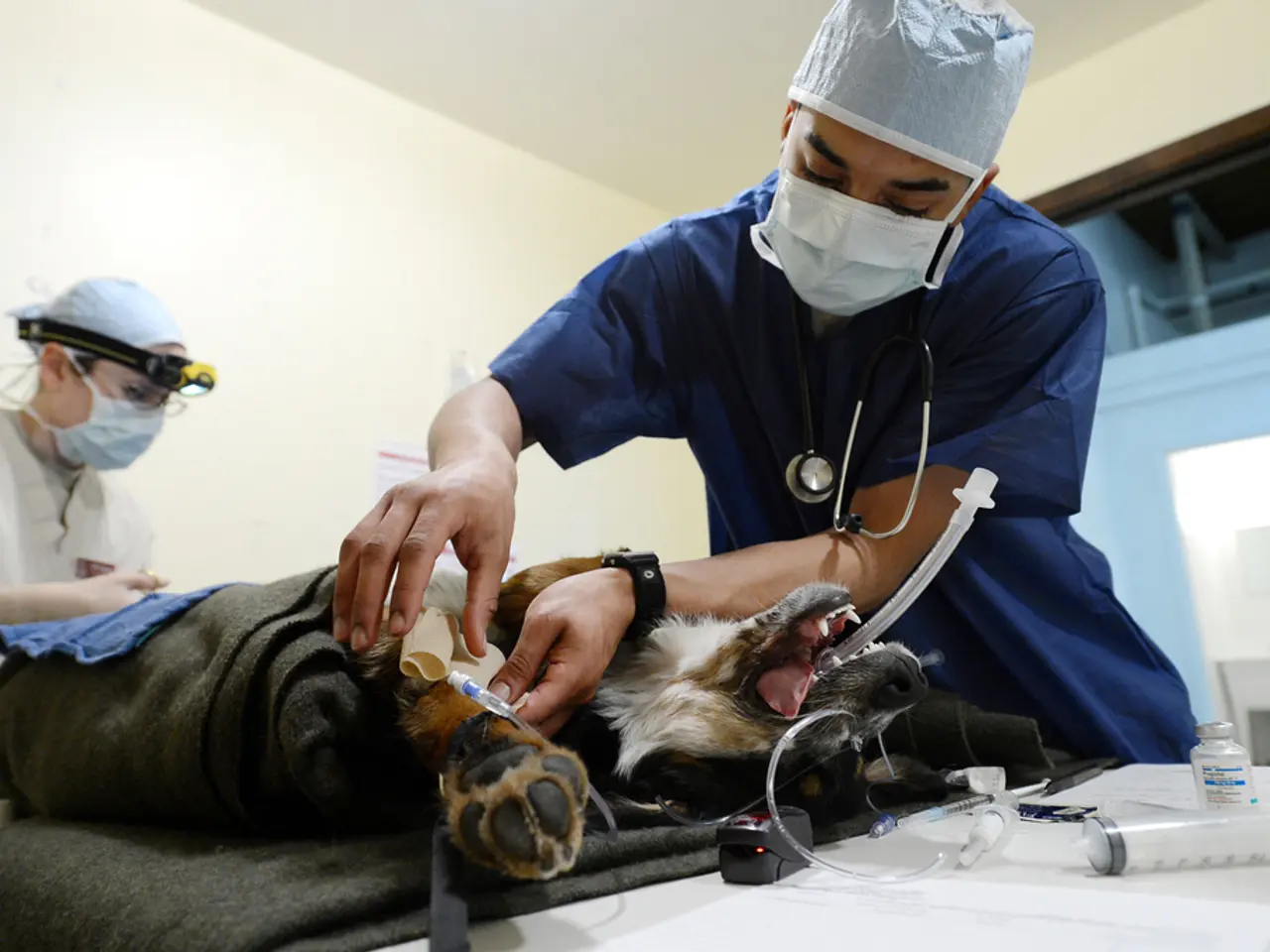The potential reason for hypoglycemia following a gastric bypass surgery.
Reactive hypoglycemia, a rare form of nondiabetic hypoglycemia, can occur in up to 10% of people following gastric bypass surgery. This condition is characterised by low blood sugar levels, typically appearing within 1-3 hours after eating a snack or meal [1].
The pathophysiology of post-gastric bypass hypoglycemia involves rapid nutrient transit and insulin release, leading to late dumping syndrome. Symptoms of reactive hypoglycemia include sweating, dizziness, confusion, rapid heartbeat, weakness, hunger, and in some cases, extreme tiredness or weakness, shaking or tremors, mood changes like irritability or anxiety, tingling lips, blurry vision, and increased heart rate [2].
To prevent and manage reactive hypoglycemia, it's essential to make dietary changes that emphasise protein and healthy fats while limiting sugar and high-glycemic carbohydrates. Here are some key strategies:
- Limit carbohydrates per meal: Aim for about 30 grams per meal and 15 grams per snack, focusing on low-glycemic options such as natural oats, whole grain crackers, legumes, beans, apples, and grapefruits. Avoid high-glycemic carbs and sugary items [3].
- Include sufficient protein: Aim for 60-80 grams of protein daily from sources like eggs, nuts, dairy, beans, meat, poultry, and fish. Protein helps slow glucose absorption and stabilise blood sugar [1][3].
- Include healthy fats: Include approximately 15 grams per meal and 5 grams per snack to help slow digestion and reduce rapid glucose spikes [3].
- Avoid concentrated sugars and sugary drinks: Candy, sweet desserts, fruit juices, and added sugar beverages promote rapid glucose absorption triggering hypoglycemia [1].
- Avoid drinking liquids with meals: Drinking fluids separately from solid food helps avoid rapid gastric emptying and glucose spikes [3].
- Space meals around 3 to 4 hours apart without skipping to maintain steady blood sugar levels [3].
- Avoid alcohol and caffeine, which can worsen symptoms or complicate blood sugar control [2][3].
- Eat a variety of fruits and vegetables (not fruit juices), whole grains, and fiber-rich foods to promote slow carbohydrate absorption and increase satiety [1][4].
Regular physical activity and close monitoring of symptoms and blood glucose help manage and prevent hypoglycemic episodes. If dietary changes do not alleviate symptoms, a doctor may prescribe antidiabetic drugs, such as metformin, to help manage blood sugar levels [5].
It's important to follow a meal plan advised by a healthcare team, including a dietitian or bariatric specialist, to personalise these recommendations safely [3][4]. If a hypoglycemic episode occurs, having glucose sources like fruit juice or glucose tablets on hand is advised for rapid treatment [3].
[1] Mayo Clinic. (2020). Reactive hypoglycemia. Retrieved from https://www.mayoclinic.org/diseases-conditions/reactive-hypoglycemia/symptoms-causes/syc-20355197
[2] Cleveland Clinic. (2021). Gastric bypass surgery: Dumping syndrome. Retrieved from https://my.clevelandclinic.org/health/diseases/18683-gastric-bypass-surgery---dumping-syndrome
[3] American Association of Diabetes Educators. (2021). Post-gastric bypass hypoglycemia. Retrieved from https://www.diabeteseducator.org/resources/patient-resources/post-gastric-bypass-hypoglycemia
[4] Diabetes UK. (2021). Post-bariatric surgery hypoglycemia. Retrieved from https://www.diabetes.org.uk/professionals/position-statements-reports/documents/post-bariatric-surgery-hypoglycemia
[5] Obesity Action Coalition. (2021). Post-gastric bypass hypoglycemia. Retrieved from https://www.obesityaction.org/patients/resources/medical-conditions/post-gastric-bypass-hypoglycemia/
- The condition called reactive hypoglycemia, a form of nondiabetic hypoglycemia, is associated with bariatric surgery, such as gastric bypass surgery, and manifests as low blood sugar levels following the consumption of snacks or meals.
- In the science of medical-conditions, the pathophysiology of post-gastric bypass hypoglycemia involves rapid nutrient transit and insulin release, which result in the late dumping syndrome.
- To manage and prevent reactive hypoglycemia, one should focus on dietary changes that favor protein, healthy fats, and low-glycemic carbohydrates, while limiting sugar and high-glycemic foods.
- It's essential to space meals few hours apart, about 3 to 4 hours, to maintain steady blood sugar levels and avoid skipping meals.
- People with reactive hypoglycemia should avoid alcohol and caffeine as these substances can worsen symptoms or complicate blood sugar control.
- A varied diet that includes a mix of fruits, vegetables, whole grains, and fiber-rich foods can help slow carbohydrate absorption, increase satiety, and promote overall health-and-wellness.
- In chronic-diseases like reactive hypoglycemia, regular physical activity, close monitoring of symptoms and blood glucose, and following a personalized meal plan advised by healthcare professionals can aid in managing and preventing hypoglycemic episodes.




